Federal Courts Strike Down Voter ID Laws In Wisconsin, North Carolina
Big losses for proponents of Voter ID laws in two swing states.
Federal Judges in two separate cases have struck down Voter ID laws in North Carolina and Wisconsin on the ground that the law impermissibly discriminates against African-American voters:
A federal appeals court decisively struck down North Carolina’s voter identification law on Friday, saying its provisions deliberately “target African-Americans with almost surgical precision” in an effort to depress black turnout at the polls
The sweeping 83-page decision by a panel of the United States Court of Appeals for the Fourth Circuit upended voting procedures in a battleground state about three months before Election Day. That ruling and a second wide-ranging decision on Friday, in Wisconsin, continued a string of recent court opinions against restrictive voting laws that critics say were created solely to keep minority and other traditionally Democratic voters away from the polls.
The North Carolina ruling tossed out the state’s requirement that voters present photo identification at the polls and restored voters’ ability to register on Election Day, to register before reaching the 18-year-old voting age, and to cast early ballots, provisions the law had fully or partly eliminated.
The court also held that the ballots of people who had mistakenly voted at the wrong polling stations should be deemed valid.
In the Wisconsin decision, Judge James D. Peterson of Federal District Court ruled that parts of Wisconsin’s 2011 voter ID law are unconstitutional. He ordered the state to make photo IDs more easily available to voters and to broaden the range of student IDs that are accepted at the ballot box.
The decision also threw out other rules that lengthened the residency requirement for newly registered voters, banned distributing absentee ballots by fax or email and sharply restricted the locations and times at which municipal voters, many of them Milwaukee blacks, could cast absentee ballots in person.
Judge Peterson’s sharply worded 119-page ruling suggested that Wisconsin’s voter restrictions, as well as voter ID restrictions in Indiana that have been upheld in the Supreme Court, exist only to suppress votes.
“The evidence in this case casts doubt on the notion that voter ID laws foster integrity and confidence,” he wrote. “The Wisconsin experience demonstrates that a preoccupation with mostly phantom election fraud leads to real incidents of disenfranchisement which undermine rather than enhance confidence in elections.”
The court decisions — the third and fourth federal rulings in recent weeks against Republican-enacted voting restrictions — were made as the two political parties raced from their summer conventions into the critical final months of the campaign, with Wisconsin, like North Carolina, considered a contested state.
North Carolina’s Republican-controlled legislature rewrote the state’s voting rules in 2013 shortly after the Supreme Court struck down a section of the Voting Rights Act of 1965 that had given the Justice Department the power to oversee changes in election procedures in areas with a history of racial discrimination. Forty of the state’s 100 counties had been subject to oversight.
Civil rights advocates and the Justice Department had sued to block the law, but a Federal District Court judge upheld it in April, writing that the state’s “significant, shameful past discrimination” had largely abated in the last 25 years.
On Friday, the three-judge panel emphatically disagreed, saying the lower court’s amply documented ruling had failed to consider “the inextricable link between race and politics in North Carolina.”
The judges noted that Republican leaders had drafted their restrictions on voting only after receiving data indicating that African-Americans would be the voters most significantly affected by them.
“We cannot ignore the record evidence that, because of race, the legislature enacted one of the largest restrictions of the franchise in modern North Carolina history,” they wrote. “The court seems to have missed the forest in carefully surveying the many trees,” they stated. The panel stopped short of reimposing federal oversight on the state’s elections, saying that striking down the law was enough.
Voting rights advocates called the ruling, which Republicans say they will appeal, a resounding victory. Fresh from speaking Thursday night at the Democratic National Convention, the Rev. William J. Barber II, the president of the North Carolina branch of the N.A.A.C.P., which is a plaintiff in the lawsuit, called the decision “a moral and constitutional vindication of our constitutional critique of this extremist legislature and our extremist governor.
“A political majority doesn’t give you the power to run roughshod over the Constitution,” he said.
Attorney General Loretta E. Lynch, who was in Baton Rouge, La., on Friday, also welcomed the decision, saying the law “sent a message that contradicted some of the most basic principles of our democracy.
“The ability of Americans to have a voice in the direction of their country — to have a fair and free opportunity to help write the story of this nation — is fundamental to who we are,” she said.
More from The Washington Post:
Voting rights activists scored legal victories in key presidential election states Friday, the most important being a federal appeals court ruling that North Carolina’s Republican-led legislature enacted new voting restrictions in 2013 to intentionally blunt the growing clout of African American voters.
The unanimous decision by a three-judge panel of the U.S. Court of Appeals for the 4th Circuit was an overwhelming victory for the Justice Department and civil rights groups. Election law experts consider North Carolina’s voter law one of the nation’s most far-reaching.
In Wisconsin, where one federal judge already had eased restrictions on voter-ID requirements, a second judge found that additional elements of the law passed by the legislature and signed by Gov. Scott Walker (R-Wis.) were unconstitutional.
U.S. District Judge James D. Peterson suggested he would strike the entire law if he were not bound by the Supreme Court’s decision that states may use properly written voter-ID laws to guard against voter fraud.
“The evidence in this case casts doubt on the notion that voter ID laws foster integrity and confidence,” Peterson wrote. “The Wisconsin experience demonstrates that a preoccupation with mostly phantom election fraud leads to real incidents of disenfranchisement, which undermine rather than enhance confidence in elections, particularly in minority communities. To put it bluntly, Wisconsin’s strict version of voter ID law is a cure worse than the disease.” The state will appeal both rulings.
In the North Carolina case, the 4th Circuit panel agreed with allegations that North Carolina’s omnibus bill selectively chose voter-ID requirements, reduced the number of early-voting days and changed registration procedures in ways meant to harm blacks, who overwhelmingly vote for the Democratic Party.
“The new provisions target African Americans with almost surgical precision” and “impose cures for problems that did not exist,” Judge Diana Gribbon Motz wrote for the panel. “Thus the asserted justifications cannot and do not conceal the State’s true motivation.”
The rulings — along with that of a state court that halted an attempt in Kansas to require proof of citizenship to register — marked important wins for opponents of restrictive voting laws that are being challenged throughout the country ahead of November’s presidential election. Put together, the decisions suggest a growing judicial suspicion of the wave of voting-restriction legislation passed in recent years by Republican-led legislatures that said it was necessary to combat voter fraud.
The decisions are likely to prompt the states to ask the Supreme Court for emergency action. But it is far from clear whether the eight justices, evenly divided between conservative and liberal, would get involved. The proximity of an election is often reason for justices to let an appeals court ruling stand.
Federal courts have been examining what are popular and, to some, seemingly common-sense laws — requiring photo ID, for instance — to see whether they favor one group over another.
In North Carolina, for instance, the judges at oral arguments noted that government-issued driver’s licenses are an acceptable form of identification but that government-issued public assistance cards — used disproportionately by minorities in the state — are not.
Republican leaders in North Carolina vowed an appeal to the high court. They issued a fiery statement denouncing the ruling “by three partisan Democrats” and suggested it was intended to help the Democratic candidates for president and governor.
North Carolina is considered a key swing state, and African American voters have played an increasing role in making it competitive.
“We can only wonder if the intent is to reopen the door for voter fraud, potentially allowing fellow Democrat politicians like Hillary Clinton and Roy Cooper to steal the election,” said Senate Leader Phil Berger and House Speaker Tim Moore.
Election law expert and law professor Rick Hasen has posted detailed analysis of both the Wisconsin and North Carolina decisions which I recommend to the attention of anyone interested in the details of what the Courts decided in those case, but both analyses are far too detailed to fairly summarize here. In essence, though, the decisions share a similarity in that they find that the discriminatory impact of the laws in question makes them unacceptable under the law, although the Wisconsin decision differs in that it picks apart various provisions of the Voter ID Law in particular that he deems to have a discriminatory impact on minorities. In the North Carolina case, though, the Court essentially found a racially discriminatory intent behind the entire law as passed, a ruling which has the impact of voiding the entire law going forward and placing voting procedures in the upcoming General Election into doubt since it will not be long before the states much begin mailing out absentee ballots, including military ballots, which are a huge issue in North Carolina due to the significant number of military basis in the state.
Given the fact that there is little evidence of the kind of in-person voter fraud that Voter ID laws are supposedly intended to combat, it’s not hard to see why the adoption of a strong Voter ID Law would raise concerns among Federal Judges. Notwithstanding that fact, though, it’s always somewhat problematic when Judges infer intent based on impact, because there is always the possibility that the law in question was motivated by other concerns not banned by Federal Law or the Constitution. Advocates for Voter ID Laws, for example, will claim that the laws are necessary to protect the integrity of the ballot, and this is assuredly a proper function of state authorities. In fact, in the abstract, there really isn’t any legitimate argument against the idea that people should be required to prove who they are before they are permitted to vote. The problem comes when you start talking about how that idea is implemented, and when it does in fact have a disproportionate impact on minorities. In those cases, the proper response of the state ought to be to reform the law to make it easier for these groups to get the paperwork necessary to participate in the electoral system, but that seldom comes to pass. The reality, though, is that the real motivation for the passage of these laws in the modern era has little to do with discriminating based on race or ethnicity and everything to do with changing the laws in ways that benefit one political party or the other in future elections, and the reason it has a disproportionate impact on minorities is because these laws are being proposed by Republicans and those groups are more likely to vote Democratic. Racial and ethnic discrimination, arguably, isn’t a primary motivation for these laws, then, but a secondary impact. Since there are no laws forbidding reforms of voting laws that benefit one party or the other, legislatures arguably ought to have more leeway than the Courts are currently giving them.
These decisions out of Wisconsin and North Carolina come on the heels of a ruling from the Fifth Circuit Court of Appeals striking down Texas’ Voter ID Law because it violated the Voting Rights Act in that it unduly discriminated against minority groups. As I noted at the time, this ruling was somewhat of a surprise largely due to the fact that the Fifth Circuit is still dominated by Republican appointed Judges and has been relatively accepting of Voter ID Laws in the past. The decisions in Wisconsin and North Carolina are somewhat less surprising in that the Fourth Circuit, which covers North Carolina, and the Judges in the U.S. District Courts in Wisconsin have been significantly more skeptical of these laws and the rationales provided by legislatures in the past in response to accusations that the laws disproportionately impact poor and minority voters due either to the forms of identification that are considered acceptable to satisfy the requirements of the law or the extent to which it makes it more difficult for such people to obtain such identification in the first place. The Federal District Court Judges in Wisconsin in particular have been particularly critical of Wisconsin’s voter reforms to the point where many of their decisions have been overturned by the Seventh Circuit Court of Appeals.
Both of these cases appear headed for appeal. In the case of the Wisconsin law, that means heading to a panel of the Seventh Circuit Court of Appeals, which has been skeptical of the rulings coming from their fellow Federal Judges in Wisconsin on this issue in the past and has reversed those decisions on several occasions. In the Fourth Circuit case, North Carolina appears to be headed toward appealing the ruling, but it’s unclear if that will mean an appeal for an en banc appeal to the full Fourth Circuit or an petition for review to the Supreme Court, which wouldn’t rule on whether or not to accept the case for appeal until some time in October at the earliest. At the same time, in both cases, a decision will also have to be made about whether or not to seek a stay of the respective rulings until after the election. In the past, decisions such as this so close to Election Day have been stayed based largely on the argument that the election apparatus of the state has already been set up to operate under the new law and requiring it to change practices on short notice would be disruptive to the election process. Given that both states could be swing states in the fall, rulings on stay requests could have a real impact on the election going forward..
Here’s the opinion in the North Carolina case:
One Wisconsin Et Al v. Thomsen Et Al by Doug Mataconis on Scribd
And here’s the opinion in the Wisconsin case:
North Carolina NAACP Et Al v McCrory Et Al by Doug Mataconis on Scribd
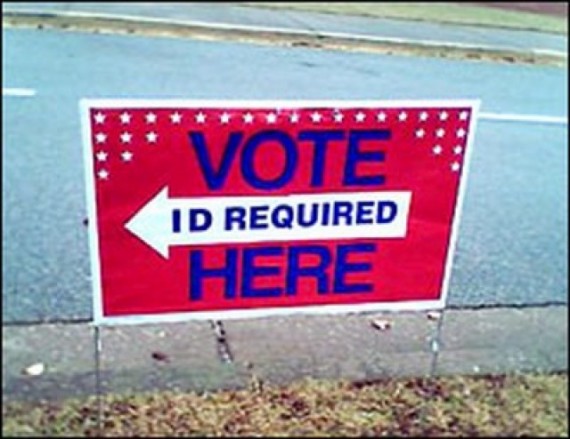

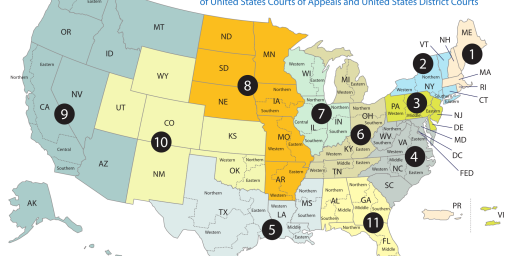
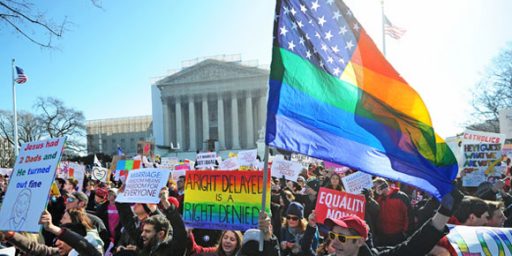
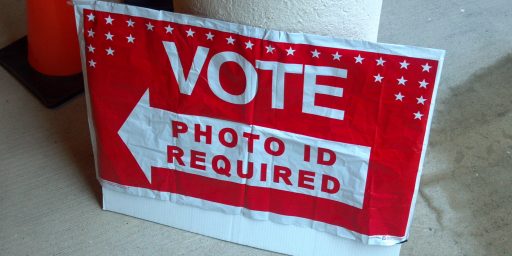
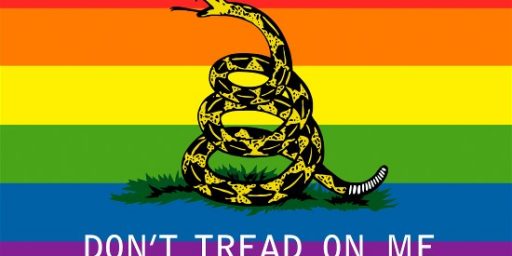
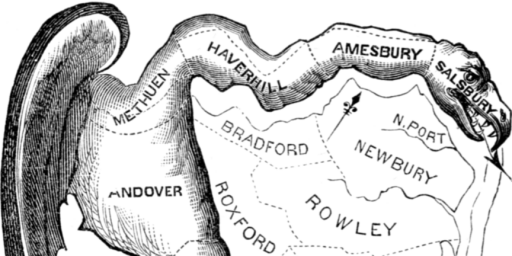
Predictably, the trolls leading the NC General Assembly are already spinning.
How did a state which not so very long ago seemed to be a model for progressive Southern politics suddenly revert to the Dark Ages bible thumping disaster it has become? It boggles the mind.
So, basically, just as Democrats said from Day One, this was always about excluding black voters. Racism.
You know, usually I don’t expect my side to be proven right about everything. This year though. . . wow.
It’s clear at the point that Scalia’s death is having an effect.
The key fact in the case seems to be that the NC General Assembly was absurdly blatant about what they were doing. In the words of the opinion:
(Emphasis added)
It’s worth quoting the next paragraph after the one the NY Times snippet above quotes:
(Again, emphasis added.)
@michael reynolds:
Actually, in this case I don’t think racism per se is necessary. It’s only necessary that the GOP legislature understand that blacks consistently vote Democrat. It’s easy to target blacks because the data are available about the mechanisms they use to vote, but I’m sure they would have been just as happy to target gays, actors, Jews, or any other Dem-leaning demographic, if that group had a distinctive pattern of using some nonstandard voting mechanism.
That’s not to say that these particular legislators aren’t racists — just that they’d have acted the same way if they weren’t.
@michael reynolds: “So, basically, just as Democrats said from Day One, this was always about excluding black voters. Racism.”
Yes, but as Doug so thoughtfully explains, it’s not so much about excluding black voters because they’re black, it’s about excluding black voters because they might vote the wrong way so it should be legal.
Reading the NC decision I feel like reading a report on Nazi war crimes. How the hell do you let this kind of stuff become public record? Were they so convinced of their own superiority that they didn’t even try to pretend and cover their tracks? I don’t know what’s more disgusting, the blatant racism or the blatant incompetence.
@DrDaveT: Not to single you out DrDave but this
assumes we have not passed the “call bullsh*t” mark. It implies that if there is any possibility, however remote, that something could be interpreted in a non-racial way we are somehow obligated to give the benefit of the doubt, despite past actions.
If a clerk short changes me once, I am happy to give the benefit of the doubt. But if the same clerk short changes me every time I come in, then it becomes absurd to continue to give them the benefit of the doubt.
The Republican party as a whole is racist as proven both by past actions and most recently by overwhelming voting for a blatant racist as their candidate. We are not obligated to keep giving them the benefit of the doubt.
Boom goes the dynamite
I think something’s wrong with the upload of the second opinion–whatever text is there, it’s almost unreadable with the weird spacing coupled with overlapping letters. Is anyone else having this problem?
P.S. also considering it’s much, MUCH easier to cheat with an absentee ballot and we don’t seem to be doing anything about that because most of THOSE voters are white….
(Yes. I insist that anyone who votes remotely do so only after showing his/her identification-with-a-picture-ID over Skype and then show him/her filling out the ballot…..)
@DrDaveT:
Women also vote more for Democrats. So do college-educated people. So do Jews. And yet none of those demos were targeted. There was no research done to discover how best to disenfranchise those voters — only black voters.
@michael reynolds:
Can I post your Racism and Sexism comment at John Scalzi’s site. He has a nice thread going on the election and I thought your comment has been the most cohesive, well though out and devastating answer as to why the Republicans nominated Donald Trump.
—
edit to add.
I will of course credit you with the comment
@Loviatar:
Of course, dude, and I’m flattered. But you might not want to mention to Scalzi that I write under a different name. He and I had a Twitter run-in, (under my professional name) and I believe I may have called him an imbecile.
I know, it doesn’t sound like something I’d say. . . or. . . okay, it kind of does.
@michael reynolds:
Actually, I’d be willing to bet that they did research to see if there were exploitable patterns in how women vote. Their law didn’t target women because they didn’t find an exploitable mechanism (e.g. different polling hours, or ID requirements, or what have you) that would specifically disadvantage women.
Again, I’ll say this in simple words for you and @MarkedMan: Of course they are racists. The evidence is overwhelming. But they would have done this particular despicable thing even if they weren’t, because the immediate motivation was to elect Republicans, and this helped do that. They would happily have disenfranchised other groups that they feel only intellectual (as opposed to visceral) distaste for, to help accomplish that goal. I don’t see how either of you can interpret this statement of fact as somehow either a denial or a defense of racism.
@michael reynolds:
NOOOO. That doesn’t at all sound like you. Must be your
bushy hairedAfro hairedpony tailedmullet wearing evil twin.What these decisions mean is that detailed analysis of the facts has shown that the intent to discriminate was so clear that even Republican appointed judges had to find against the laws.
These decisions constitute an implicit rebuke to Chief Justice Roberts and those SCOTUS judges who have held that the pre clearance provision of the Voting Rights Act was outmoded and no longer needed.I hope that the conservative bloc will rethink their position on this. Certainly, the liberal bloc has had its position vindicated. What all this means is that if these decisions are appealed to the SCOTUS, they will likely to be either affirmed or that the Court will let the decision stand on a 4-4 split.
Sadly, there will not be Congressional action on the VRA unless there is a wave election in favor of the Democrats giving them both Houses. We can only hope that with a President Clinton and a Democratic Senate majority, a pro VRA Justice be appointed. After that, hopefully, the worst decision of the Roberts Court (Shelby County vs. Holder) will one day be overruled.
The blatant hypocrisy in this statement just amazes me, re: the “fiery statement denouncing the ruling “by three partisan Democrats” and suggested it was intended to help the Democratic candidates for president and governor”:
So it’s OK to block voters for partisan benefit, but not unblock them if it has partisan benefits?
Wow….
As for the point that the primary motivation for this kind of voter-restriction was partisan rather than racism seems to be logical. If the black voting populace was voting in the majority for the Republic candidates, then you can bet this kind of restriction would not have gone through…That just seems to fit the MO here for the Republic law-makers who pass these kind of laws.
To target other Democratic-leaning voters, they use other methods, for example like college students who live the majority of the year in a district are being restricted more and more from voting in that district.
Well, back in 2013, Justice Roberts, and his conservative Supreme Court colleagues, in a 5-4 decision, eviscerated the Voting Right Act of 1965, with Robeerts saying:
Basically Justice Roberts was saying that, ‘sure the VRA handled race-based voter discrimination, but that was then this is now and it’s no longer necessary, and if in the small chance id does it does happen again Congress will have to address that, even though there’s no chance that a Republican Congress would do so. Thanks for coming.’
Liberals were right on this issue. Most predicted that Republican-controlled statehouses would, in the wake of trashing the VRA of 1965, stampede to implement voter suppression laws. And that is exactly what happened.
@MarkedMan:
Actually, I agree with @DrDaveT:. We have to avoid making the same mistake conservatives do when they lump all Muslims together. Not all Republicans are alike. Certainly Trumpitis is largely motivated by racism. It’s largely unconscious. Self awareness is not a front line virtue on the right. I do believe, however, that the Republican establishment and country club Republicans are no longer racist. They are classist. They don’t care if you’re black, brown, green, or white, if you’re not rich, you’re a “47%” taker and screw you. They are, however, just as willing as Trump to use race to get the people they’re screwing to vote for them. They’re just a bit more sophisticated in how they do it.
@Robert in SF:
I now own residences in Ohio and FL. I could cheat and vote in both. From what I read a significant number of people do. Actual, for real, illegal vote fraud. Ever hear a GOP rail against it? Could it be because it tends to be older white people, a lean R demographic?
@stonetools:
Wouldn’t the law getting overturned anyways be evidence in favor of Roberts being right that the pre-clearance process was unnecessary to enforcing the VRA?
And conversely, if preclearance is necessary for protection of civil rights, why not apply it to all of the states? Aren’t voter ID laws in Pennsylvania just as in need of preclearance as ones in North Carolina?
Could it be that most of the “pre-clearance” jurisdictions just happen to lean Republican and Democrats like a system that provides Democrat influence over redistricting in red states without the corresponding Republican influence over redistricting in blue states that universal application would bring?
@Stormy Dragon:
I ( and most supporters of the VRA) are completely on board with that.
Now do you see this Republican Congress reviving the Voting Rights Act by re-writing the VRA in this way? I don’t (and I believe you don’t either). A Democratic majority Congress likely would.
@stonetools:
Then why didn’t they between 2008 and 2010?
@michael reynolds:
IIRC the NC legislation did target college students by making student ID’s not acceptable as photo ID and by making it harder to establish residence in the town you were going to school in.
Of course there are a lot of HBCU’s in NC so that’s still probably a twofer.
I spent enough time working in Wisconsin to know that if the cheese heads call someone ni99er instead of fvckin’ ni99er, that’s just them being nice.
@Stormy Dragon:
No. The point of preclearance is to prevent states from screwing people over. Not to let people get screwed over and have it resolved years after the fact. There’s a reason it took over 15 years after Brown v. Board for the states to integrate schools yet the VRA worked almost instantly.
@Stormy Dragon:
If you remember, they were a tad busy then, what with a worldwide economic crisis, passing HCR, and all.
I find it a bit tiresome that conservatives keep insisting that the Democrats should have solved every conceivable legislative problem in the brief period between August 2009 and January 2011 , when they had filibuster proof legislative majorities.
You might also want to look at when Shelby County vs. Holder was decided.( Hint: it was after 2010).
The Federal Courts have no authority under the Constitution to abrogate state Legislative action except that authority they have given themselves when the New Deal Court re-wrote the 14th Amendment. For 70 years after the enactment of the 14th Amendment the Federal Courts held the Amendment did not give the Supreme Court the authority to invalidate state Legislative action. I addressed this issue in my recent book TYRANTS IN BLACK ROBES-How the Federal Courts Destroyed our Republic.
Meanwhile, in other News, Donald Trump is saying that Generals Macarthur and Patton would not have used email in their wartime communications ( I’m not making this up).
He apparently thought that they were in same theater of war and could communicate by courier. Count the history of World War II as something else Trump is clueless about. James, maybe you might want to share this with your military buddies.
@stonetools: @Stormy Dragon: Not only were there other matters to consider, it was really 72 days.
This GOP talking point of why didn’t Obama fix it in the two years the Ds had a veto proof Senate is, like virtually everything else they say, tiresome BS.
I note that the hue-and-cry for voter ID implementation across the country has died down rather significantly in the last month or two. It seems logical to wonder if the reason for that is that those making the call for voter ID have begun to recognize that no matter who wins, Trump or Hillary Clinton, we all lose anyway. Kind of a moot point.
@Boyd Hartman:
Actually it’s the Fifteenth amendment and it pretty blatantly gives Congress the authority to regulate the states on voting rights.
@Boyd Hartman: Is the subtitle “PS — I Am Not a Crank”?
@Boyd Hartman: By the way, Boyd, Amazon has your book listed as historical fiction, not history. And in the two historical fiction categories it weighs in at #50,943 and #139,470. Pretty impressive stuff there.
They were skeptical. After Judge Poesner
realized he had been played for a foolsaw the light, I think the 7th circuit is going to be much friendlier to VRA proponents.I read recently on an anti-Trump RWNJ outlet (RedState, if I recall correctly) that the needs of the Republican party dictated closed primaries because it was self-evident the Mr Trump was foisted on the R’s by mischief making Democrats.
That is the essence of the Republican/conservative mind. Start with the desired end and work backwards to the restrictions on democracy needed to achieve it.
@wr: How many pages had not yet been colored?
Oh please, where was this hue-and-cry, except among Republicans, conservatives, and racists? This North Carolina case is the best proof yet that these laws are enacted for no other reason than to help Republicans keep Democratic constituencies from voting…it is truly pathetic that some Republicans seem to think that the only way they can win is to limit who votes…this is undemocratic and un-American…
@Console:
They tried to implement a proposal that would have forced college students to return to the county which is their home of record or obtain an absentee ballot from the same in order to vote, and which negated tax deductions for the parents if the students didn’t comply. It died a quiet death in committee.
The intent behind it (to discourage college students from voting) couldn’t have been any more blatant. They didn’t even try to hide it.
@Boyd Hartman:
🙄
Another one of those people … Yay
@Boyd Hartman:
You mean besides those nifty Supremacy and Necessary & Proper Clauses contained in the original document?
Question: is being a Tenther painful? It should be excruciating.
@DrDaveT: Actually, white women don’t vote Democratic in huge numbers. Single white women do, but not married ones.
Voting is a right, and that right is protected under the equal protection clause. (Refer to Reynolds v Sims)
If (some) states are restricting (some) voters for no particularly good reason, then you have a constitutional problem, regardless of the rationale. One would hope that the political party that keeps yammering on about the constitution-this and rule-of-law-that would understand that the constitution protects voting and that voting rights cannot be restricted for arbitrary reasons, but that may be too much to ask.
@gVOR08:
They were always classist; it’s where the whole idea of “country club” comes from. What caused the derision from conservatives (the good Republicans) was their support for civil rights and social programs. They still believed in what Kipling referred to at “the white man’s burden.”
@Monala: “Actually, white women
don’thaven’t in the past voted Democratic in huge numbers, but this may change in 2016.FIFY
@HarvardLaw92: Art Pope specifically, and a generation of conservative talk radio and Fox News more generally. https://en.wikipedia.org/wiki/Art_Pope
One problem that proponents of these laws had in Wisconsin, North Carolina, and Texas is that they were caught on the record, and made admissions during testimony that they were targeting minorities with these laws, although ostensibly not because they were minorities but because they thought they would vote Democratic. But of course, through out the South in the current generation, “Democrat” = “Black,” and that the White South is once more a “One Party” region.
@DrDaveT:
It’s a distinction without a difference. Blacks vote Democratic because of GOP racism, Republicans attempt to disenfranchise black voters because they vote Democrat. Which came first? GOP racism, clearly. The end result arose from the first cause which was racism.
@michael reynolds:
Not if you care about truth.
Look, I get it. I understand the historical causes, the feedback loops, the mechanisms. But it’s just plain wrong to yell “Racism!” every time, even if historical racism is a major causal factor. As others have pointed out, there is ZERO chance that the NC General Assembly would have passed these laws if (by some odd happenstance) NC blacks tended to vote Republican. (Stranger things have happened.) That makes it clear that in this instance the motivation was not racism — it was voter suppression.
Was the effect racist? Sure. But these same legislators would happily have done the same thing to any white bloc that they could have targeted as cleanly, and they would NOT have done the same to the Asians that tend to vote GOP, no matter how much contempt they feel for them in their personal lives. NC Republican legislators are racists, but they would have done this even if the affected parties were lily white. It is possible to have more than one character flaw.
@Boyd Hartman:
The Judiciary Act of 1789 allows the Supreme Court to review the constitutionality of state statutes. 1 7 8 9.
Electoral fraud is a crime. And people are more likely to associate crime with Blacks, and that is racist as hell.
When I moved here some time ago, I went in to vote, but I needed to show some official proof of address. Luckily I had just received a power bill and they accepted that. I am sure that my Columbia Record Club and disco club cards would not have been accepted.
I think it should certainly be illegal to have voter id laws that are made for and focus on certain groups.
Just what forms of id will the courts approve ?
Now when I go into vote I only have to give them my name and
address. But that is just a formality since the poll worker knows most everyone around here .
It would be interesting to hear Thomas Jefferson’s opinions on this subject.
Most people think that voter fraud happens only in the big city. I knew one lady whose deceased parent was still voting ! And that was in a small town. It was also a white person doing that, so that claim that black people mainly do it is wrong.
I read about a case last year where some judge told a city that they had to provide more early voting days. Strange. People will complain about long voting lines, but don’t mind a 2 hour wait to ride a roller coaster or get into a concert.
That’s enough thought for now – the temperature is heading up to another 97 degrees feels like 105 humidity 75 % day; have to stay cool.
Every now and then i run across dummies on FB who say some version of “why is it so hard to get a driver’s license to vote durr durr durr.” so this was interesting from the 4th circuit court, via kevin drum:
Circuit Court: North Carolina Law Targeted African-Americans “With Surgical Precision”
@Mu: “Reading the NC decision I feel like reading a report on Nazi war crimes. How the hell do you let this kind of stuff become public record? Were they so convinced of their own superiority that they didn’t even try to pretend and cover their tracks? I don’t know what’s more disgusting, the blatant racism or the blatant incompetence.”
Notice that they got caught and ‘slapped down’, but that they will suffer no penalties.